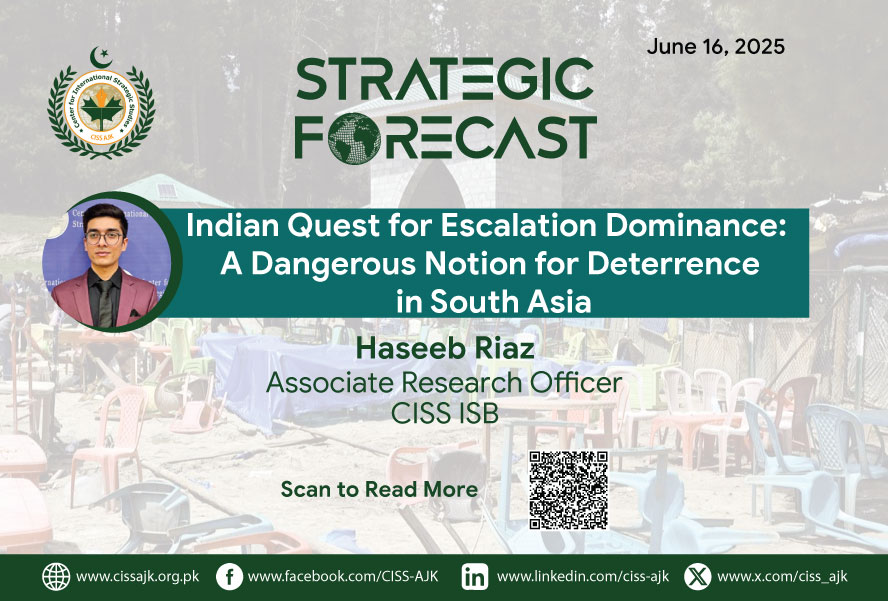Almost a month has lapsed since the dangerous escalation between India and Pakistan that was unleashed by the Pahalgam attack in Indian Illegally Occupied Kashmir (IIOJK) on the April 22nd. Immediately after the attack, India launched a series of missile and armed drone attacks throughout Azad Jammu and Kashmir and into areas of mainland Pakistan, killing more than two dozen civilians, including women and children. These strikes were a serious affront to the territorial sovereignty and national integrity of Pakistan and a flagrant disregard for international norms regarding the use of force. Pakistan’s response focused on legitimate counter force targets with only aiming military installations within India, avoiding civilian targets in a bid to maintain strategic proportionality. Viewed retrospectively, this episode underscores a perilous trend in New Delhi’s evolving military posture—an assertive pursuit of escalation dominance that dangerously tests the limits of deterrence stability in South Asia. The situation de-escalated in a rather surprising turn of events when President Donald Trump announced that a negotiated ceasefire has been achieved by US’ efforts between the warring parties.
Since the past two decades or so, different terror incidents carried out by non-state actors in IIOJK, have elicited a wide range of responses from the various Indian governments. But from the intense stand-off (2001-02) to alleged surgical strikes (2016) and then the Pulwama-Balakot crisis (2019), Indian allegations against Pakistan, without providing any sound evidence, has been a recurring theme. The recent incident at Pahalgam replicated a similar positioning by New Delhi without any concrete proof of linkages with Pakistan. Such allegations are tantamount to building a case for striking Pakistan, though the attack occurred as a result of the Indian intelligence and security failure and was carried out by an indigenous armed group, the Resistance Front (TRF)), as it reportedly claimed responsibility for the attack. Analysts widely interpret the emergence of groups as a reaction to systemic repression and cultural erasure imposed by Indian authorities in the Occupied region. Kashmiris, historically known for their largely non-violent political resistance, are pushed towards militancy when all avenues for peaceful expression and dialogue are blocked.
These so-called ‘responses’ by India have intensified over the period, crossing different conventional thresholds. All this point towards a more sinister scenario of the Indian quest for escalation dominance in a nuclearized environment. Then there comes the war mongering of the Indian digital media and policymakers which exhibits the dangerous notion of a limited war below the nuclear overhang between the two countries. In this manner, the eruption of the recent limited war between the two countries has once again laid bare the Kashmir issue as a nuclear flashpoint.
The diffusion and management of post-nuclearization escalations without any nuclear crisis can give a false sense of confidence to the strategic planners regarding their ability to curtail crises across the border. This can especially embolden the Indian decision makers in the future to up the ante for asserting dominance in the escalation ladder. It can inadvertently lead to an uncontrollable disaster in a very short time. Military crises are not new to India and Pakistan, but the escalating trajectories in the past two decades paint a grim picture for strategic stability in the region.
Another factor is the increase in economic and political clout of India, with shifting currents of global politics leading to Indo-US strategic partnership, which has enormously encouraged India to flex its military muscle against Pakistan with impunity.
This points towards the cementing of escalation dominance by India, in the wake of the India-Pakistan crisis. This may also erode ‘crisis stability’ in the future conflicts as well by incentivizing India to attack Pakistan with little fear of retaliation.
Pakistan’s strong response according to some, took India off-guard as a retaliation wasn’t expected by the Indian leadership as Indian PM Modi mentioned in his speech with utmost surprise that “rather they started attacking us.”
A terrorist attack instigated India to breach the sovereignty of Pakistan; and India is to be blamed for starting the escalation. After the overt nuclearization of the region, Pakistan has strived to dominate the escalation ladder, along with maintaining a superior force ratio at decisive points, to maintain deterrence and preserve peace by raising the stakes for the aggressor in the wake of military confrontation with India. This has deterred India so far from engaging Pakistan militarily and escalating things to the point of no return. A full-scale conventional war has also been averted thus far. On the other hand, India’s wish to dominate the escalation ladder, coupled with the desire for a limited conventional war under a nuclear threshold, can be extremely dangerous for the conventional stability and nuclear deterrence in the South Asian region. Comparing Pakistan and Indian responses in the past escalations, Pakistan has always emerged as the guarantor of peace and stability by exercising restraint in the face of blatant violations of international law from the Indian side.
Pakistan’s avowed policy of “quid pro quo plus”, as was evident from the Pulwama-Balakot crisis in 2019, retaliation means that any Indian strike, no matter how limited, will be met with a response designed to inflict equal or greater pain.
By attacking Pakistani civilians and military installations, India put to test Pakistani resolve to maintain its sovereignty and national integrity. Pakistan’s response was calculated; retaliatory and only legitimate military targets were engaged which shows Pakistan’s respect for international law, by deliberately avoiding civilian casualties during the heat of the conflict.
Author
Haseeb Riaz, Associate Research Officer CISS ISB.

